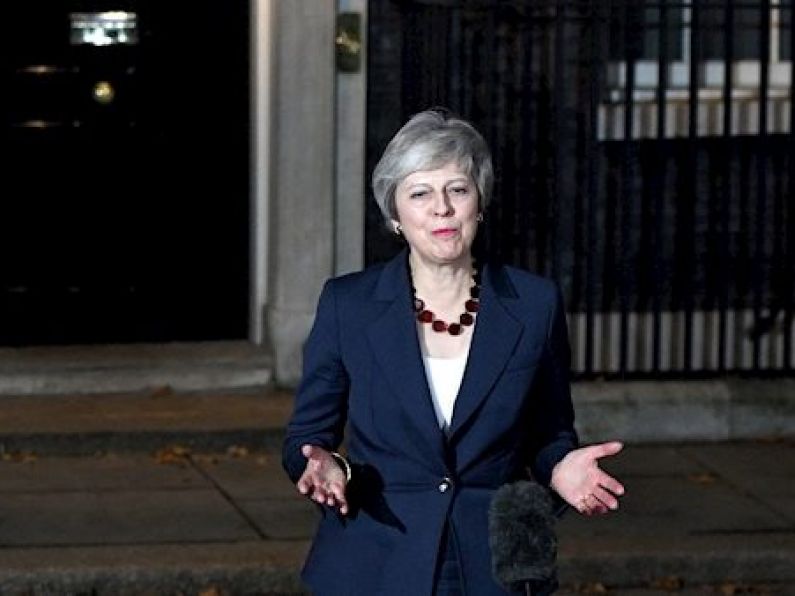What has happened?
After months of tense talks, on Monday night EU and British negotiators finally signed off on an agreed Brexit deal wording, a development which emerged on Tuesday evening.
The 500-page deal hinges on three points, namely a "temporary" UK-wide customs union, a "review" of this customs union, and "deeper" customs union and regulatory rules for Northern Ireland.
What does this mean?
The deal, which is effectively a soft Brexit, means Britain can continue to benefit from the customs union with the EU after it leaves the common market.
It also means there will be a guarantee of no hard border on the island of Ireland because different rules will apply for the province compared to the rest of Britain.
What was the reaction?
While the response from the Irish Government was officially non-committal, senior Government sources said "it's what we need", while EU officials are also understood to back the deal.
However, in Britain hard-line Brexiteers and the DUP - the latter of whom's 10 MPs are crucial to the Conservatives remaining in power - lashed the deal as the "worst" possible and risking making Britain and EU "slave state".
The claims were made because the DUP believes Northern Ireland will still be treated differently to the rest of Britain, and because Brexiteers believe the UK could be trapped in a never-ending customs union-limiting Britain's independence.
What happened next?
In a five-hour emergency cabinet meeting in London, British prime minister Theresa May faced down intense Brexiteer opposition to say the deal is what is in Britain's best interests.
In a statement just after 7pm, Ms May said after a "long, detailed and passionate debate" the British cabinet has taken the "collective" decision to back the deal, effectively saying it is this deal or no deal.
However, it is far from clear how "collective" this claim is, with Ms May accepting she will face "difficult days ahead" and "intense scrutiny" with rumours of a no confidence motion - which could force a snap British election - growing on Wednesday night.
Similarly, Taoiseach Leo Varadkar held a lengthy special cabinet meeting in Dublin on Wednesday morning, while a similar EU ambassadors meeting also took place in Brussels on Wednesday afternoon, with the deal quietly supported at both meetings.
So the Brexit deal is over the line?
You must be joking.
Everything relies on what happens in Britain and Northern Ireland, meaning the white smoke from Downing Street on Wednesday night could just as easily be found tomorrow to be little more than more muffling, blinding fog.
While Ms May just about managed to overcome the first Brexit deal hurdle on Wednesday, she must now convince her party, the DUP and the rest of Westminster to also sign off on it at a crucial parliamentary vote next month.
However, before then, Ms May could face a no confidence motion in her premiership from her own back-benchers and almost certainly a few furious cabinet members.
If successful, this would force her from power and throw Britain into either a snap election which would put the deal on hold or see a hard-line Brexiteer who has no intention of agreeing to the deal take over without a public vote.
What happens now?
Ms May will go to Westminster tomorrow morning to face another "long, detailed and passionate debate" among MPs, and on Wednesday night held a meeting with DUP leader Arlene Foster and a phone call with Sinn Féin's Mary Lou McDonald and Michelle O'Neill.
EU chief negotiator Michel Barnier is expected to meet with Britain's Brexit secretary Dominic Raab in Brussels on Thursday at which point the agreed deal legal text will be published - moves which were meant to happen on Wednesday night.
This will clear the way for a special EU summit to formally agree the full deal on Sunday week to agree a soft Brexit.
Is Ireland doing anything?
Oh yes, and that in itself is of note.
Without any provocation on Wednesday, Taoiseach Leo Varadkar told the Dáil he will seek a Dáil vote on the deal next week.
This sounds fine in theory.
But it has been noted it opens up the option for Mr Varadkar to seek a snap election himself before March as all parties will have formally backed the deal - meaning a change in government will not change anything.
And the deal?
For the moment, it is still in place. But with a British political civil war looming, the key words are "for the moment".






